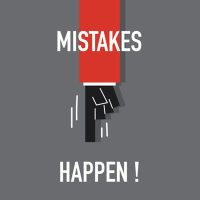Mistakes Happen, Which Is Why There’s Will Reformations

When we draft any legal documents, including ones related to estate law, we try to make sure those documents are accurate, updated and mistake free. But often mistakes do happen. The problem in probate law is that the person whose will or estate document is being interpreted isn’t around anymore to clarify or correct a mistake, the way they would be if there was a mistake in a normal contract. So can a court change what’s in a will, if it seems like there was some kind of mistake made in it?
Reformation of Wills
A court can alter or amend a will if there is a true bona fide error. This is called reformation.
As a general rule, courts stay away from reformation, whether of contracts or wills, because the court doesn’t want to re-write an otherwise complete document. A court won’t substitute its judgment or wording for that of the original writer.
But courts will reform, and thus rewrite wills, when there is an actual error.
Examples of errors may be:
- Leaving a business or property to beneficiaries, but the address of the property or the name of the business, is incorrect
- Someone misnames or mislabels a beneficiary—for example, leaving property to “my uncle,” when the beneficiary does not have an uncle
- Someone is disinherited, believing that the beneficiary is dead, when the beneficiary is actually alive
- Someone leaves property to “My current wife,” but accidently uses the name of a former wife.
- Laws change ruining the intent of the will
These are all situations where the person who made the will was competent, knew what he was doing, and was not under any kind of influence; there is no question as to competency or the validity of the document as a whole.
A High Burden
A court will reform a will—but not easily. To show that there was a mistake that was made, the parties seeking to reform the will must prove the mistake by clear and convincing evidence, which is a much higher standard than that which is normally used in a civil or a probate case.
The parties can use external evidence to prove their case, like witnesses, other documents, or any other evidence that shows what the testator (the maker of the will) actually intended. Even if the reformation of the will contradicts what is expressly written in the will, it can be reformed, so long as the intent of the testator can be determined.
Get it Right the First Time
Although you can reform a will to correct an error or omission, it is not the best option. Often, reformation contests end up being costly and protracted—whomever gets less from the will if the reformation is effectuated, will no doubt contest the reformation.
Call the Torrance will and estate attorneys at Samuel Ford Law today for help with your estate planning needs or with any probate matter that you may have.
Source:
law.justia.com/cases/california/supreme-court/2d/41/509.html
